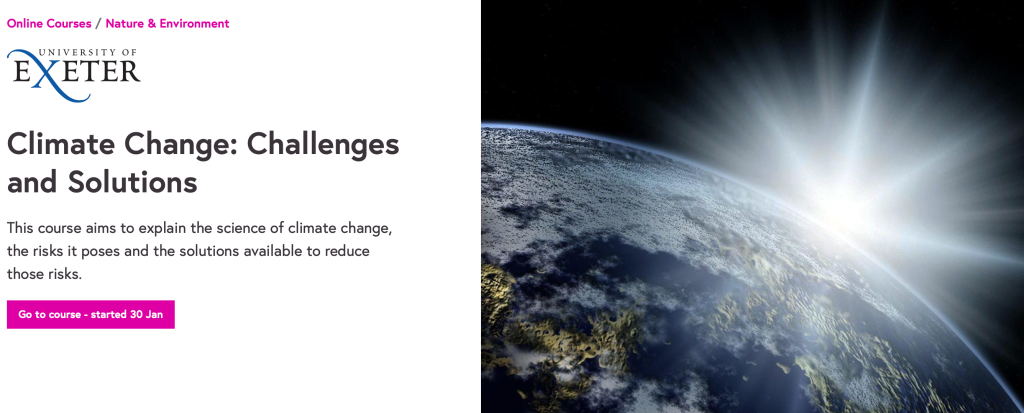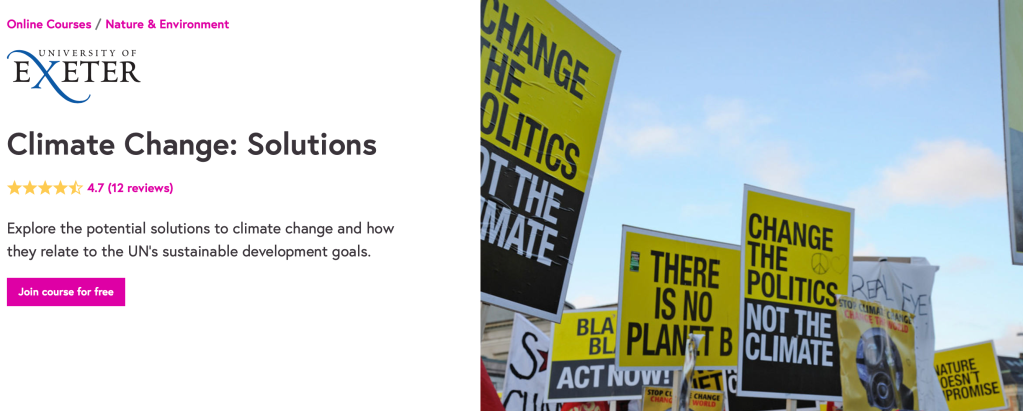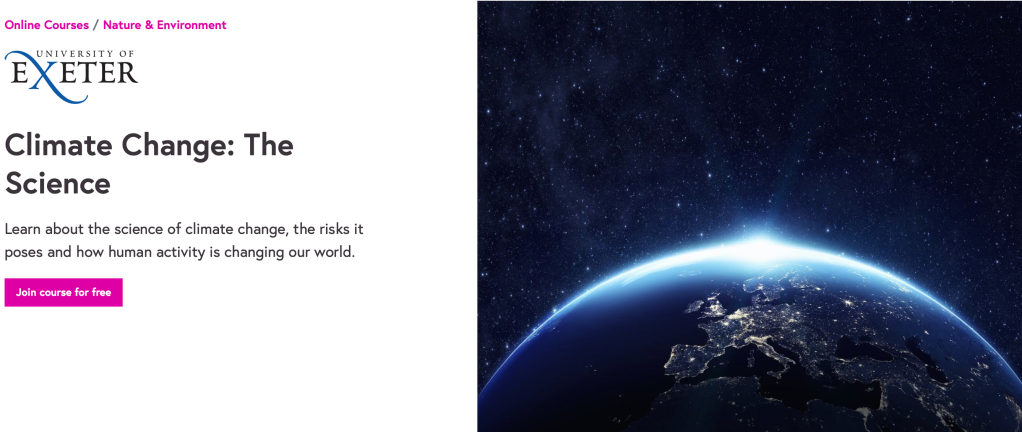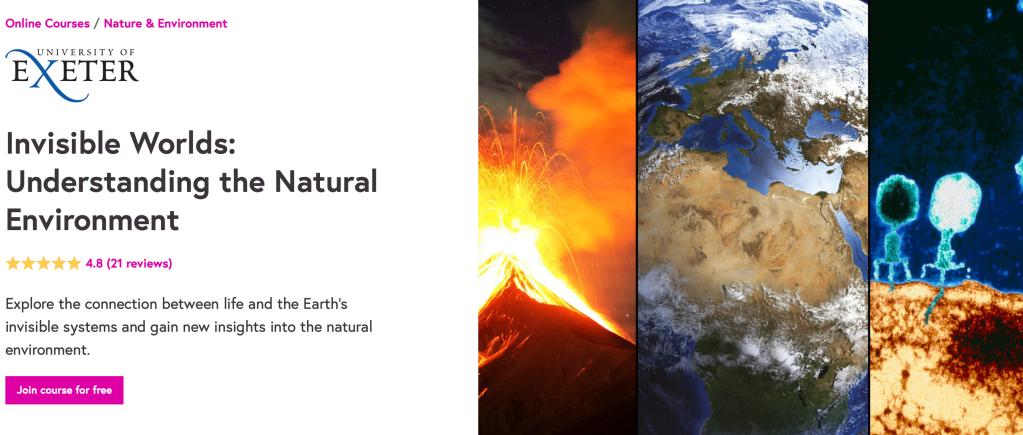By Daneen Cowling
What’s a MOOC?
Massive Open Online Courses (MOOC’s) are becoming a widely used method to up-skill and educate. Free courses ranging in all sorts of subjects and skills are produced by universities and companies, all over the world. With the courses, interactive activities and alternative learning methods are used to educate it’s learners. Some courses also have facilitators/mentors, which help guide discussions and questions – sometimes being the experts doing the teaching. The biggest draw to these courses in my opinion, is the ability to have a global learning experience, unlike anything else. The platforms are available to global learners, which means you can have interesting discussions with completely unique ideas and views you would have never before been exposed to. This global learning network, in combination with interactive and varied learning methods, make MOOCs and incredibly useful and insightful means of education and CPD.
My Experience with MOOCs
I was motivated to write this blog as I have had such a positive experience with MOOCs, specifically the climate science ones from the University of Exeter, I wanted to share how they have helped my education/academic and professional development journey.
LEARNER
My journey started in Sixth Form (Havant Sixth Form College) where, as a keen geographer preparing to write a UCAS application to study BSc Geography at the University of Exeter (2015). I wanted to see if there was anything else I could do to help my current learning and something additional to discuss on my personal statement. I can’t remember how I came across the course – potentially from a blog of things you can do additional at sixth form or something …
I came across FutureLearn which is one of the main platforms for MOOCs. The website is super accessible and gives lots of options to find courses that suit you e.g. the subject/the duration/the course creator. By filtering by environmental courses, by chance I was able to find the brand new course launched by the University of Exeter; “Climate Change: Challenges and Solutions”. The course was amazing, nothing like anything I’d experienced before. The course was made up of mostly videos with some articles and interactive activities. Straight off the bat, you introduce yourself and why you’re joining etc., which is amazing to see all these fellow learners state their jobs and countries they live in, ranging in ages, it was very exciting to start learning with this community.
The video material was mostly of Dr Damien Mansell (who later became my first-year tutor and uni) and Professor Tim Lenton (who is an absolute legend and became my dissertation and masters supervisor .. soon to carry on working with him for my PhD!). Along with other scientists from Exeter and other institutions, the material was communicated so effectively because they were all enthusiastic leaders in their fields. Tim is especially good at communicating all sorts of science – which for the case of the course ran through Earth’s climate history to future solutions. The experience was so interactive, even with all the videos and articles that were included. What I was learning was so exciting and interesting in the way it was communicated, I always found myself researching more and continuing interesting discussions in the comments.
This was such a useful resource to have at A level, not only for the high level of teaching consistent throughout but how the introduction to new resources (e.g. research papers), the language and the collaborative environment enhanced my learning experience in Sixth Form. Not only this, but the course also set me up incredibly well for university. From this course, I was able to see the benefit of having the confidence to discuss ideas with fellow learners, which meant this transition to a similar environment at University came fairly effortlessly. The material on the course also crossed-over to a lot of the Geography course material in my first year and whet my appetite for things I could see myself specialising in my second and third years. Moreover, from being taught by Tim and Damien via an online course to then have close academic relationships with them and be taught by them in a lecture hall was pretty surreal!
I don’t want to be bold a say this course single-handedly got me into Exeter on the course I love, but I definitely believe it helped my case by demonstrating I was keen on the subject and be initiative to learn more. It really helped with my UCAS application and has been a useful example for other applications since. I think MOOCs are effective tools for A-Level students – all for the reasons I have explained. They are even useful for uni students, incredibly accessible methods of learning with no ‘age bound’ tie to the material covered. I’ve made suggestions for other students to use it at my old sixth form, and hope to keep encouraging more to use MOOCs as a form of learning and skills development.
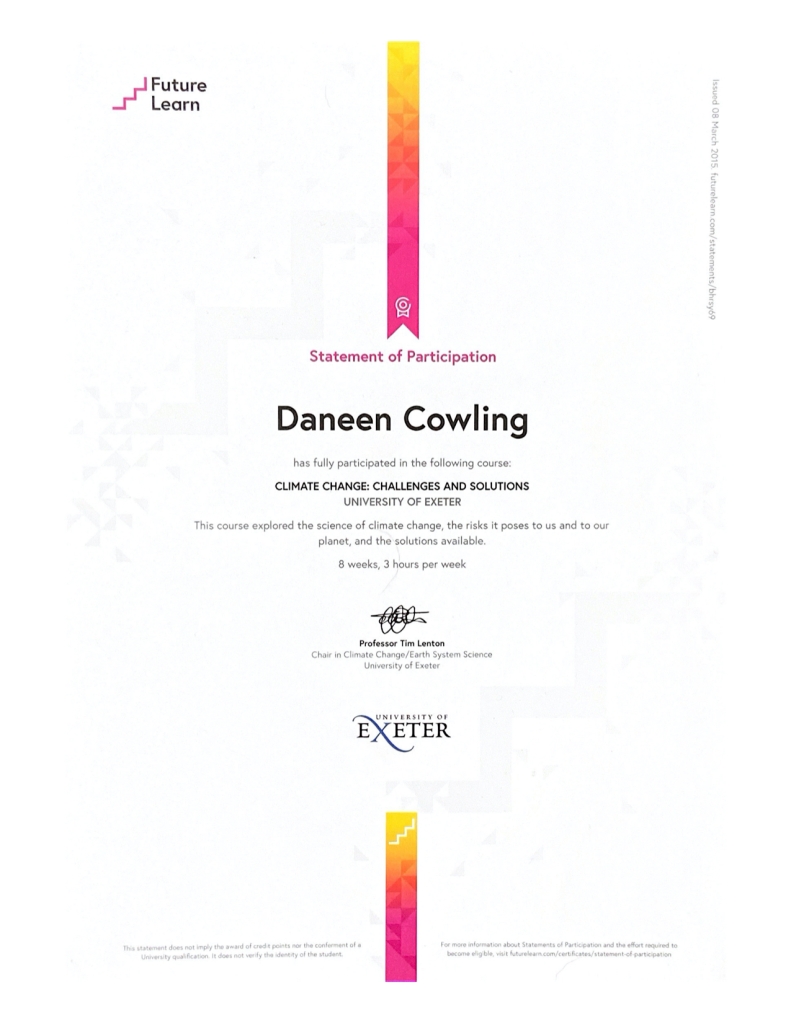 I loved the course so much I paid for a certificate of participation after (~£30)
I loved the course so much I paid for a certificate of participation after (~£30)
FACILITATOR/MENTOR
In my second year of university, I also got the opportunity to become a facilitator/mentor on the climate change MOOC. Of course, participating in the course during sixth form was a massive benefit in the interview and definitely contributed to getting the role. The job was great to meet new like-minded people on the facilitator team, earn money flexibly around my studies, and stay current with the science – which helped my learning alongside. Being a facilitator on the course consisted of answering any questions the learners had beyond the course material, and directing them to any additional resources that would be useful to help understand some of the new concepts. As a facilitator, I was also responsible for maintaining healthy discussions between learners. This could be via asking a question in the comments for others to respond and discuss amongst themselves or monitoring some responses/flagging issues where needed in case some dialogue turned negative and inappropriate. Each week, a team of myself and the other facilitators (UG and post-grad students), and Tim and Damien, sat on live video Q&A sessions. These were really interesting and a great challenge to think on the spot with the pressure of being recorded. These sessions were well received by learners – so very satisfying to know we were helping with their learning journey!
The experience I had in this role was great, I learnt a lot more about the subject from hearing new ideas and perspective, and also learnt new discussion facilitation skills. Further, I developed my appreciation and enthusiasm for science communication. So much so – I applied for the role again in my final year! This time with a year’s experience in the role, I was more senior to the new applicants and so I was a useful contact to have if they ever had issues with setting up/dealing with difficult people on the platform/useful resources. With my experience, I was also invited to sit on a panel – with facilitator and content corrector colleague Liam Taylor, to talk about our experiences with the MOOC and facilitation as a useful learning tool. Our audience were academics from other disciplines, keen to get going on their own MOOC plans, but wanted to see how the facilitation element works and benefits the learner experience. I was also able to contribute to video material to promote the MOOC’s, talking of my own experiences as a learner and a facilitator.
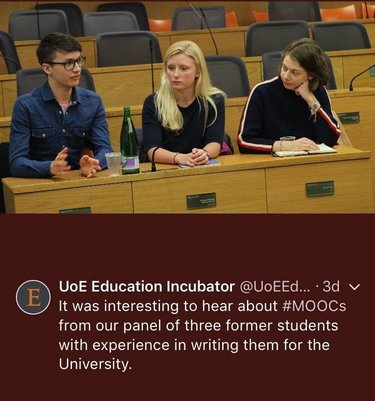
I’m happier than I look I promise …
CONTENT CREATOR
During my final year, I also got to create some new content for the new split to two separate courses; The Science and one for The Solutions. During the summer I had an internship with Artecology; an ecological engineering company creating better places for biodiversity. One of their signature designs is a vertipool – an artificial rock pool imprinted with shapes and textures that testing has shown to enhance the species diversity and richness on what would have previously been a textureless and mostly lifeless seawall. They are specifically tackling the climate change and construction driven problem of “coastal squeeze” – whereby space for species to live is fighting a losing battle against rising sea levels and rigid coastal protection structures. This innovative and urgently needed solution seemed like it would fit nicely on the course, to communicate more localised issues of climate change and what current solutions are in place to tackle them. I enjoyed creating this content, and from the discussions with learners, it seemed to be a good addition. It was also advantageous to cooperate with industry on the course, to bring home this isn’t just a university-led response, real companies are making changes – and others should follow. Artecology has since gone on to promote the course and the MOOC method of learning, so this addition has been a great positive for Exeter course promotion and industry involvement, and for Artecology.
I was also able to continue this creator role during my MSc (2019). This time, to work as part of a collaborative team with Tim and Liam, alongside the Eden Project, to create a new MOOC called Invisible Worlds. This was an incredible opportunity to really use all my experiences with MOOCs over the past 4 years. I was able to craft the content and the narrative the Eden Project wanted for their course, into something that was accessible and interactive for learners. The project was a creative challenge to strike a good balance and consensus between the University and the Eden Project – but the course was largely a success and complimented Edens new expedition. It was interesting to do the ‘behind the scenes’ work on Future Learn too – making the right tweaks so the information is portrayed the best it can be.
Courses I’ve been involved with as a learner, facilitator and creator
If it’s not already been made obvious – I think MOOC’s are amazing. These Exeter MOOCs have continued to contribute to my academic and professional development, and I have no doubt their contributions are yet to end. It’s been great to watch and be a part of the growth in the content available and demand for more courses, especially how useful they have been during the current COVID crisis. Hopefully, schools, colleges and universities can become more aware of all the free educational resources that are available at such a high standard of quality. More significantly, these MOOCs should also be more accessible to those outside an academic bubble – those in industry or just those curious and keen to learn! Education and the experience that comes with MOOC learning is incredibly special and something to be continually shared. I look forward to trying more MOOCs myself and explore more creative contributions to make to the University of Exeter growing catalogue of courses.
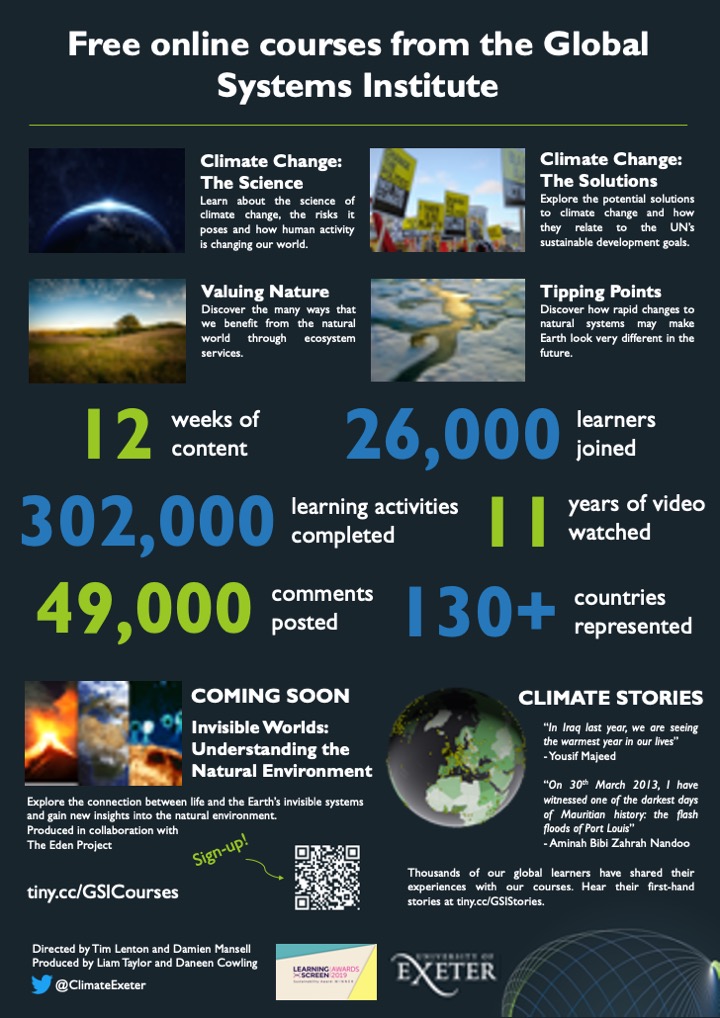
The Future of Global Systems Thinking Conference (2019)
Links to University of Exeter Climate Change Courses (Global Systems Institute Outputs/Tim Lenton Led):
Valuing Nature: Should We Put a Price on Ecosystems?


